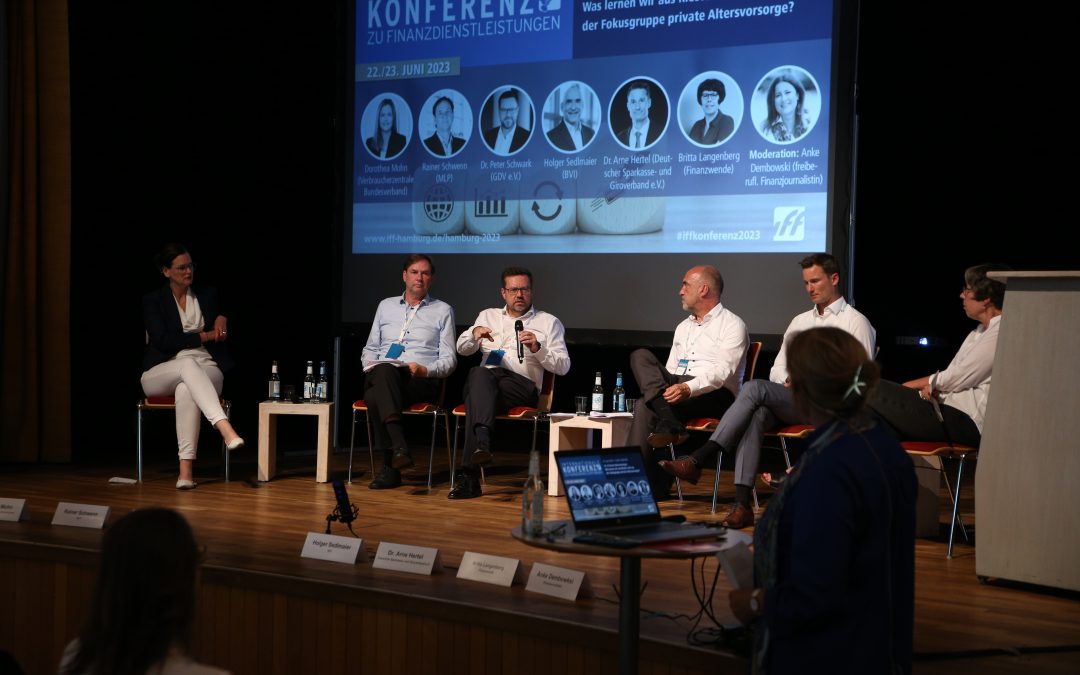At the 18th International Konferenz zu Finanzdienstleistungen in Hamburg, the panel with the following title took place on 22 June 2023: "Private pension provision: What do we learn from Riester and from the focus group on private pension provision?"
The panel was well-balanced with stakeholders who view the topic of private pension provision from different angles:
- Peter Schwark, Deputy Chief Executive of GDV (German Insurance Association)
- Holger Sedlmaier, BVI, Head of Taxes and Retirement Provision at BVI (German Fund Association)
- Arne Hertel, lawyer. Head of Capital Markets Law at the German Savings Banks Association (DSGV).
- Rainer Schwenn, Actuary DAV at MLP Finanzberatung SE
- Dorothea Mohn, vzbv (Federation of German Consumer Organisations), Head of the Financial Market Team
- Britta Langenberg, Head of Consumer Protection, Finanzwende e.V.
Anke Dembowski, a financial journalist and Fondsfrau, was the moderator.

The challenge of retirement provision
The background to the discussion is that three D's are currently among the major challenges facing society:
- Digitalisation
- Decarbonisation
- Demographic change
In the coming decade, the "baby boomers" will retire bit by bit. At the same time, fewer and fewer young people are entering the labour market and often do not want to take 100% jobs (according to the IAB, the part-time rate in Q2 2022 was 38.8%). The question is: how can the longer retirement phase be financed?
The Riester pension was initially a good concept, but due to low interest rates and complexity, there is now an urgent need for reform. In addition, the small size of the pensions raises questions. According to the pension insurance report, the monthly Riester payment in 2020 was 113 euros.
Nevertheless, the Riester pension must be acknowledged: As a voluntary solution, it has become widespread and, with around 16 million contracts, is considered by many to be one of the most successful subsidised models in Europe.
All in all, the Riester pension recently experienced quite a full brake: in 2022, there was a loss of two-thirds of the providers and up to 90 percent fewer new contracts, and the portfolio figures are also collapsing. The train of subsidised private old-age provision in Germany has come to a halt.
Focus group on private retirement provision of the BMF
Therefore, the Riester pension must be put to the test, and time is pressing. A solution must be found in this legislative period, because there is no time for a miss in view of the demographic development. All stakeholders should help: Product providers, consumer advocates, financial experts, politicians.
To this end, the Federal Government set up the focus group on private old-age provision in November 2022 to find a solution for subsidised private old-age provision. It is chaired by Dr Florian Toncar, Parliamentary State Secretary of the Federal Ministry of Finance. A final report is to be presented in the summer of 2023.

Meeting of the focus group on old-age provision at the BMF in Berlin, 24.01.2023.
Despite different interests, at the end of the day it is all about the citizens who want to have an adequate pension. The question is: How can we keep Riester provision attractive and vital in the current environment?
Controversial discussion about many aspects of Riester 2.0
There was unanimity in the discussion group that the Riester pension should be reformed. The individual aspects of how a possible Riester pension 2.0 should be designed, however, were discussed extremely controversially. The following aspects were highlighted:
- Crux of the matter: What do you think about the warranty? How can we also provide citizens with a subsidised pension product with more returns? After all, we are talking about long-term savings, which possibly allow for a certain amount of capital market risk.
- who should be the beneficiary ?Also civil servants? Also self-employed? All citizens?
- what about the scale for private supplementary provision? Of course, it depends on how long you pay in, how much you pay in and the return. But according to the pension insurance report, the actual Riester pension in 2020 averaged only 113 euros per month. Do such "manageable" pension amounts really help to solve the pension problem? In other countries, the sums are significantly higher.
- Does it have to be ready products or can the citizen be left largely free to choose the instruments he or she prefers? (Funds, also ETFs, insurance, shares, gold...). Theoretically, these could all be placed in a custody account earmarked for pensions (otherwise blocked).
- Private providers or the State as provider?Or should the state only organise and tender? The hope is that a state-organised model will have lower costs.
- In general: How do you get the costs under control? Should ETFs, for example, also be taken into account? What do the sales organisations have to say about this? After all, the Riester subsidy is complex, and in order to explain complexity, the distributors need time and have to earn money with it.
- And in the end... Should a Retirement be made compulsory, or a One-time payment be possible
These many questions still open at the panel discussion show that many things are still open and a compromise cannot be reached tomorrow or the day after tomorrow. But we have to keep at it, because the topic of old-age provision will not become easier in the future in view of demographic developments.



